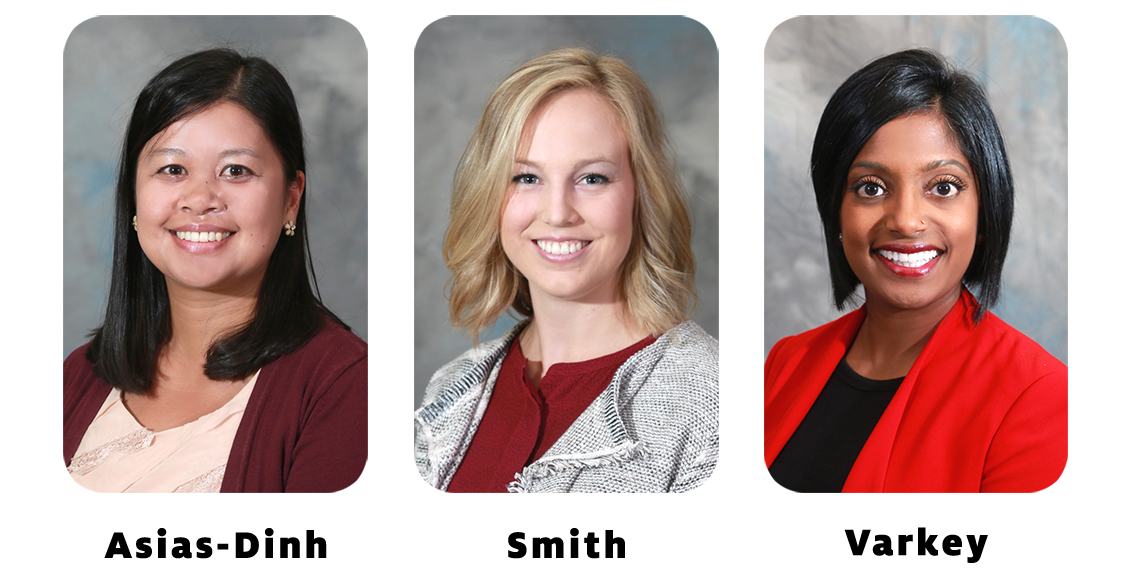Research News

Merits and Metrics
3 Faculty Members Receive UH New Faculty Grants for Projects to Enhance College's Academic Programs
With support from the UH New Faculty Grant Program, a trio of UH College of Pharmacy faculty members is embarking on innovative research projects designed to provide real-world data that will enhance components of the educational experience for students at the college.
Each supported by a $6,000 grant from UH's Division of Research, Clinical Assistant Professors Bernadette Asias-Dinh, Pharm.D., BCPS, CDE, and Katie Smith, Pharm.D., BCACP, and Clinical Associate Professor Divya Varkey, Pharm.D., M.S., will conduct their research over the next year.
Impact of Student-provided Screenings
Asias-Dinh’s study, "Pharmacy student-lead community health screening for chronic disease identification: impact on public health and pharmacy student professional growth," aims to assess the ability of health screenings performed by UHCOP Pharm.D. students to detect patients who potentially have an undiagnosed chronic disease.
"As far as I know, I don’t think there is comprehensive data that shows what we’re doing is effective in identifying potential diseases through these health fairs," Asias-Dinh said.
During this study, she’ll be looking at how many screenings the students are performing and the number of abnormal findings that need to be addressed by a physician. In future studies, she would like to follow up with patients to determine the ability of counseling by pharmacy students to motivate patients to follow-up with a primary care provider about a given screening result and how many of those patients have a confirmed diagnosis.
Through surveys and roundtable discussions, Asias-Dinh's study also will explore student attitudes in their professional growth as a result of participating in health-screening events.
Interprofessional Care Exposure
Smith’s study, "Effect of interprofessional healthcare exposure on students’ perceptions of interprofessional care," focuses on assessing the pharmacy students’ perception of interprofessional collaboration among various health care professionals with whom the students interact before and after rotations.
Study data will be collected through the Interdisciplinary Education and Perception Scale survey, which asks students about their perceived need for collaboration and perception of their competence and those around them, among other things.
"We want to ensure our students are getting exposed to interprofessional collaboration and assess their perception of the experience because it’s been shown through other studies that interprofessional collaborative practice improves clinical outcomes," Smith said.
After compiling the survey results, Smith will identify best practices in interprofessional care among the practice sites. Those best practices will be shared with all of the sites for the benefit of advancing collaborative academic and practice environments and ultimately patient care.
Emotional Intelligence
Varkey’s study, "Impact of graduate training on emotional intelligence," will measure the change in a professional's emotional intelligence after completing postdoctoral studies in pharmacy leadership, specifically participants in the two-year Houston Program in Pharmacy Leadership & Administration. A collaboration between UHCOP and seven fellow Texas Medical Center health systems, the Houston Program culminates in a M.S. degree from UHCOP and PGY1 pharmacy practice and PGY2 Health-System Pharmacy Administration residencies.
Emotional intelligence, which is the ability to identify and manage your own emotions and the emotions of others, will be evaluated through a 133-question test. Participants will be asked about how specific emotions influence their performance and how they interact with people in a professional setting.
The study is designed to include nearly 100 participants, including Houston program applicants, current Houston Program participants, and alumni of the program from the past five years.
Varkey began this study because she wanted to understand if the Houston Program’s training is impacting leaders in a way that is the most effective.
"Are we focusing on the right things?" Varkey asked. "We may give them a lot of information, but if we don’t tell them how to use it, then are we really doing them a service?"
-- by Ameena Rasheed